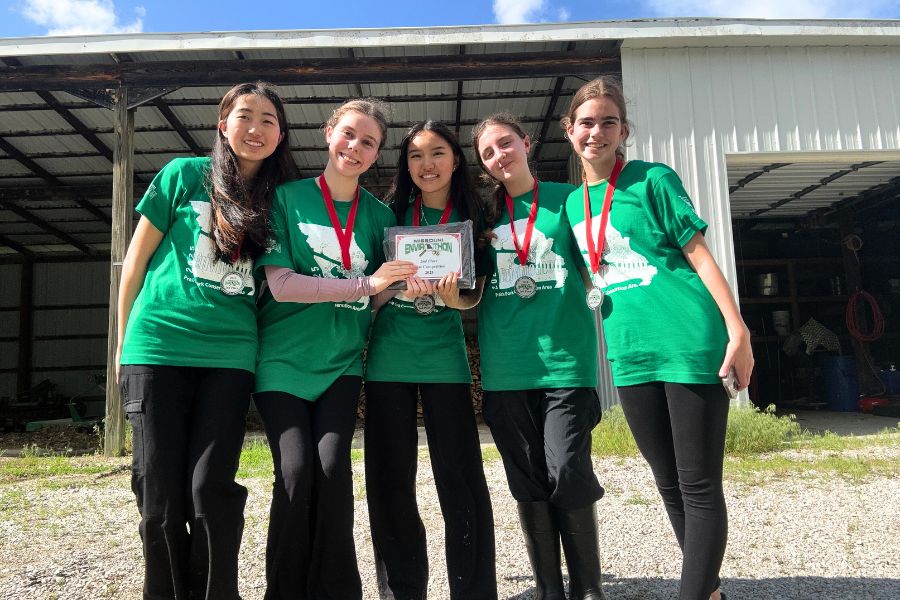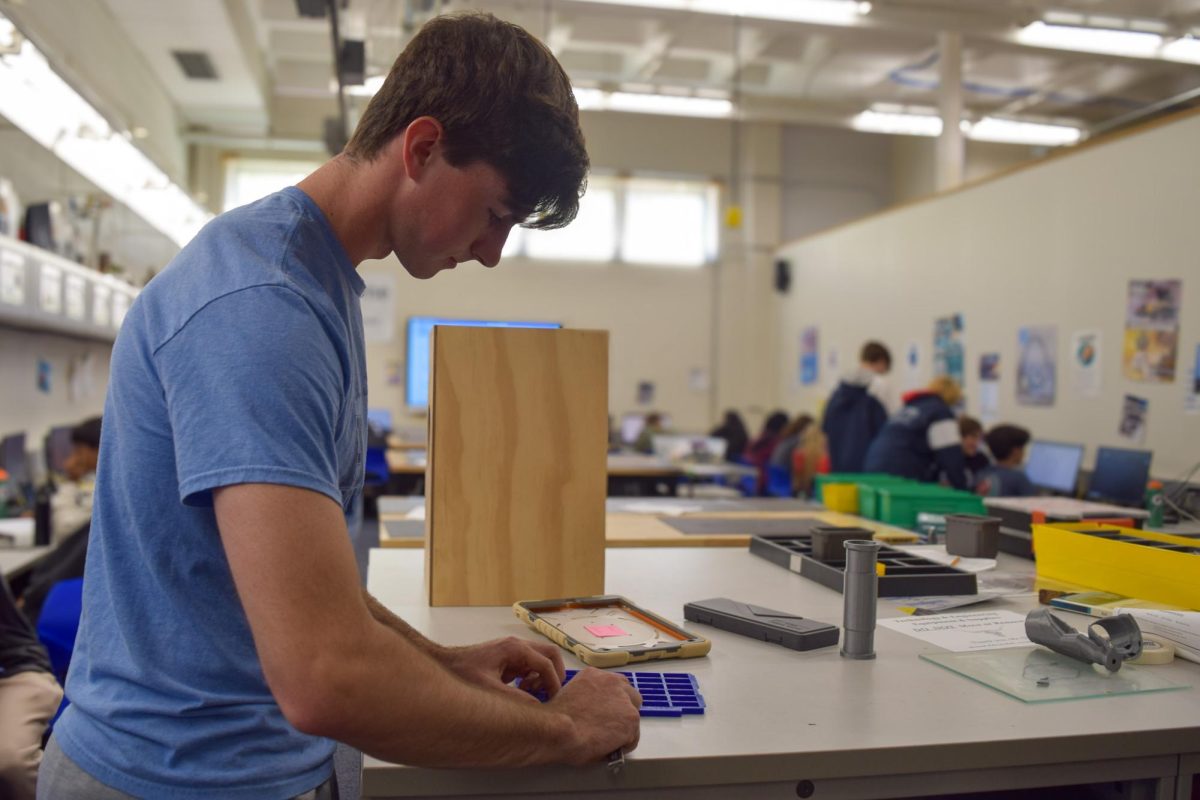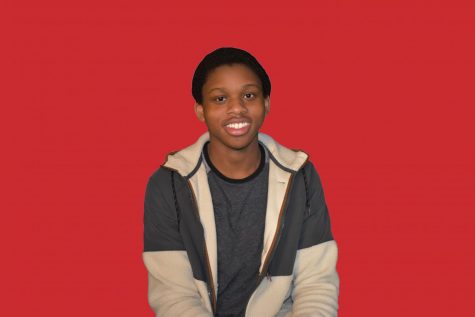Students enter through the doors of the school ready to start their day, but instead of sitting at their desks to start their morning work or turn in their homework, students socialize until they feel they are ready to begin working. By students taking responsibility for their own education, alumna Alexis Franklin opens up the Saint Louis Sudbury School to support this cause.
Franklin started a Sudbury school, a school that emphasizes that each student should have responsibility for their own education. The school also adopts the idea that students and teachers all have equal voices.
“I was going to college to become a teacher, and I was doing my student teaching internship; everyone around me was miserable,” Franklin said. “The kids were resisting every step of the process. The teachers around me were burnt out, exhausted and frustrated. It just seemed like it wasn’t working.”
Franklin proceeded to find a way that she believed would properly educate students, maximize their potential and make themselves more self-reliant.
“I think that it is widely understood that the system is broken. It seemed like I could spend my whole career trying to change it in small ways, and it’ll just be exhausting and fruitless,” Franklin said. “I was researching alternatives, and a particular model of education, the Sudbury model, really resonated with me.”
Because the idea resonated with her, Franklin believes the Sudbury model is a more natural way to educate students.
“It just seems very authentically human because I was just reading this book by Peter Gray called “Free to Learn,” and it talks a lot about hunter-gatherers and the way that the Sudbury model has tapped into what is natural to our species like the age mixing,” Franklin said. “For example, to have a multi-generational culture that is modeled after adults without being coerced into the curriculum is what the Sudbury model is about.”

Students are not given any structured curriculum, teachers, tests, homework or grades.
Although students in the school do not learn in the traditional setting of sitting at a desk, Franklin speculates that students will learn more social skills in the Sudbury setting, which according to Franklin, is more important in the future.
“When [students] get something positive out of a regular school experience, it’s the intangibles they talk about: social skills, standing up for themselves, managing their time or being respectful,” Franklin said. “It’s never algebra or biology. The actual academic content is easy to pick up when it becomes relevant, so the Sudbury School focuses on instead creating structures; it really fosters the intangibles like having students work together collaboratively on a day-to-day basis instead of being shuffled around from classroom to classroom and not being allowed to talk at specific settings and [about] different topics. This allows people to be driven by their interest and curiosity and develop a strong sense of self in a strong sense of community.”
Moving forward, Franklin would like to focus on the number of students enrolled at the school.
“We have encountered a lot of people who have been huge fans of the Sudbury model for a really long time, and they’ve contemplated moving to Massachusetts, Seattle or these other places where major Sudbury schools exist. They’re just extremely grateful that we’re finally in St. Louis,” Franklin said. “The major task at hand is just to grow enrollment. With this kind of school, the bigger, the better because the more different things people are working on, the more exposure everyone has to new ideas and new skill sets.”

![As she looks over a student's shoulder, alumna Alexis Franklin hosts a Meet and Greet event at Tower Grove Park to introduce prospective parents to the Sudbury education model. Franklin opened up the school last August and began enrolling students. “We have a really supportive group of parents who jump at every opportunity to help me out,” Franklin said. “They’re really trying to talk to their friends and try to get new kids involved. [They’re] really supportive and positive.”](https://pwestpathfinder.com/wp-content/uploads/2020/02/sudbury2-900x596.jpg)


![Focused on providing exceptional service, sophomore Darsh Mahapatra carefully cleans the door of a customer’s car. Mahapatra has always believed his customers deserve nothing less than the best. “[If] they’re trusting us with their car and our service, then I am convinced that they deserve our 100 percent effort and beyond,” Mahapatra said.](https://pwestpathfinder.com/wp-content/uploads/2025/10/DSC_0018-1200x800.jpg)
![Sophomore Aleix Pi de Cabanyes Navarro (left) finishes up a soccer game while junior Ava Muench (right) warms up for cross country practice. The two came to Parkway West High School as exchange students for the 2025-2026 school year. “The goal for the [exchange] program is to provide opportunities for both Parkway students and our international exchange students to learn about other cultures, build connections and become confident, capable, curious and caring — Parkway’s Four C’s — in the process,” Exchange Program Lead Lauren Farrelly said.](https://pwestpathfinder.com/wp-content/uploads/2025/10/Feature-Photo-1200x800.png)

![Gazing across the stage, sophomore Alexis Monteleone performs in the school theater. The Monteleone family’s band “Monte and the Machine” has been releasing music since 2012, but Alexis started her own solo career in 2024 with the release of her first single, Crying Skies. “My whole family is very musical, [and I especially] love writing [songs with them],” Monteleone said.](https://pwestpathfinder.com/wp-content/uploads/2025/09/DSC7463-1200x798.jpg)
![Amid teaching a lesson to her AP Calculus BC class, Kristin Judd jokes alongside her students in their funny remarks. Judd has always enjoyed keeping the mood light in her classroom, along with on the volleyball court. “[I enjoy] that side talk where you see [or] overhear a conversation and chime in, or somebody says something funny,” Judd said.](https://pwestpathfinder.com/wp-content/uploads/2025/09/image-1200x730.jpg)
![Eyeing the ball, junior Ella McNeal poses for her commitment pictures at Clemson University. McNeal’s commitment comes after months of contact with top Division 1 soccer programs. “ It has taken a lot to get to where I am, but I know that [what] I've already been through is just the beginning, and I can't wait for what is to come,” McNeal said.](https://pwestpathfinder.com/wp-content/uploads/2025/09/IMG_4926-1200x900.jpeg)


![Senior Adam Zerega stands with senior Dexter Brooks by farm equipment. Zerega often worked with friends and family on his farm. “I've been able to go to my family's farm since I was born. I [spend] at least three weekends a month [on the farm], so I'm there all the time,” Zerega said.](https://pwestpathfinder.com/wp-content/uploads/2025/04/IMG_4872-1200x900.jpg)

![After a thrilling point, senior Katie Byergo and junior Elle Lanferseick high-five each other on Oct. 8. With teamwork and camaraderie, Byergo worked together in the game against Lafayette High School. “[Byergo’s] is really positive with a good spirit,” Lanferseick said. “I set her [the ball] and she hits it [or] gets the kill.”](https://pwestpathfinder.com/wp-content/uploads/2025/10/DSC_9349-1-e1761159125735-1200x791.jpg)
![Leaning on the podium, superintendent Melissa Schneider speaks to Parkway journalism students during a press conference. Schneider joined Parkway in July after working in the Thompson School District in Colorado. “My plan [to bond with students] is to get things on my calendar as much as possible. For example, being in [classes] is very special to me. I am trying to be opportunistic [meeting] kids [and] being in [the school] buildings. I have all the sports schedules and the fine arts schedules on my calendar, so that when I'm available, I can get to them,” Schneider said.](https://pwestpathfinder.com/wp-content/uploads/2025/09/IMG_5425-1200x943.jpeg)

![Leaping through the air, senior Tyler Watts celebrates his first goal of the season, which put the Longhorns up 1-0 against the Lafayette Lancers. Watts decided to play soccer for West for his last year of high school and secured a spot on the varsity roster. “[Playing soccer for West] is something I had always dreamed of, but hadn’t really had a good opportunity to do until now. It’s [really] fun being out [on the field], and I’m glad I decided to join the team. It’s just all about having fun with the boys and enjoying what time we have left together,” Watts said.](https://pwestpathfinder.com/wp-content/uploads/2025/09/DSC_1951-1200x855.jpg)

![Shifting global trade, President Donald Trump’s tariffs are raising concerns about economic stability for the U.S. and other countries alike. “[The tariffs are] going to pose a distinct challenge to the U.S. economy and a challenge to the global economy on the whole because it's going to greatly upset who trades with who and where resources and products are going to come from,” social studies teacher Melvin Trotier said.](https://pwestpathfinder.com/wp-content/uploads/2025/05/MDB_3456-1200x800.jpg)

![Pitching the ball on Apr. 14, senior Henry Wild and his team play against Belleville East. Wild was named scholar athlete of the year by St. Louis Post-Dispatch after maintaining a high cumulative GPA and staying involved with athletics for all of high school. “It’s an amazing honor. I feel very blessed to have the opportunity to represent my school [and] what [it] stands for,” Wild said.](https://pwestpathfinder.com/wp-content/uploads/2025/05/unnamed-6-1200x714.jpg)
![Red, white and blue, the American flag holds the values of our democracy. The fight that we once endured has returned, as student journalists and senior correspondents across the country are losing their voices due to government control. “[Are] the White House and [the] government limiting free speech [and] freedom of the press? Yes [they are],” chief communications officer of the Parkway School District and former journalist Elisa Tomich said.](https://pwestpathfinder.com/wp-content/uploads/2025/03/Untitled-design-14.jpg)
![Freezing in their position, the Addams Family cast hits the “rigor mortis” pose after cast member and senior Jack Mullen, in character as Gomez Addams, calls out the stiff death move. For the past four months, the combined company of cast members, orchestra pit, crew and directors all worked to create the familial chemistry of the show. “I’m excited for [the audience] to see the numbers, the music, the scenes, but I also just love all the technical aspects of it. The whole spectacle, the costumes, makeup and the people that put in the work backstage in order to make the show successful on stage. I’m excited for people to see and appreciate that,” Mullen said.](https://pwestpathfinder.com/wp-content/uploads/2025/03/DSC0116-1200x800.jpg)
